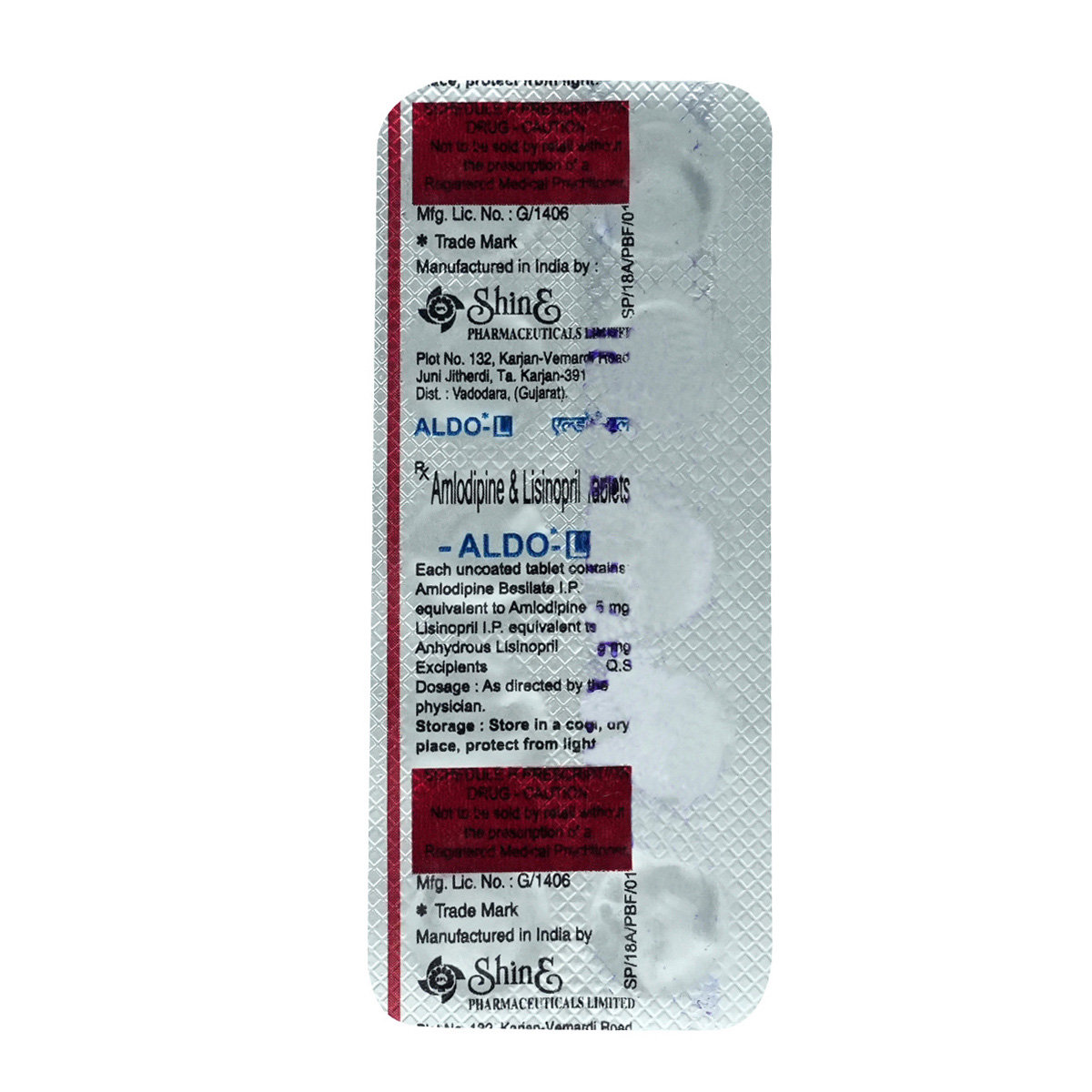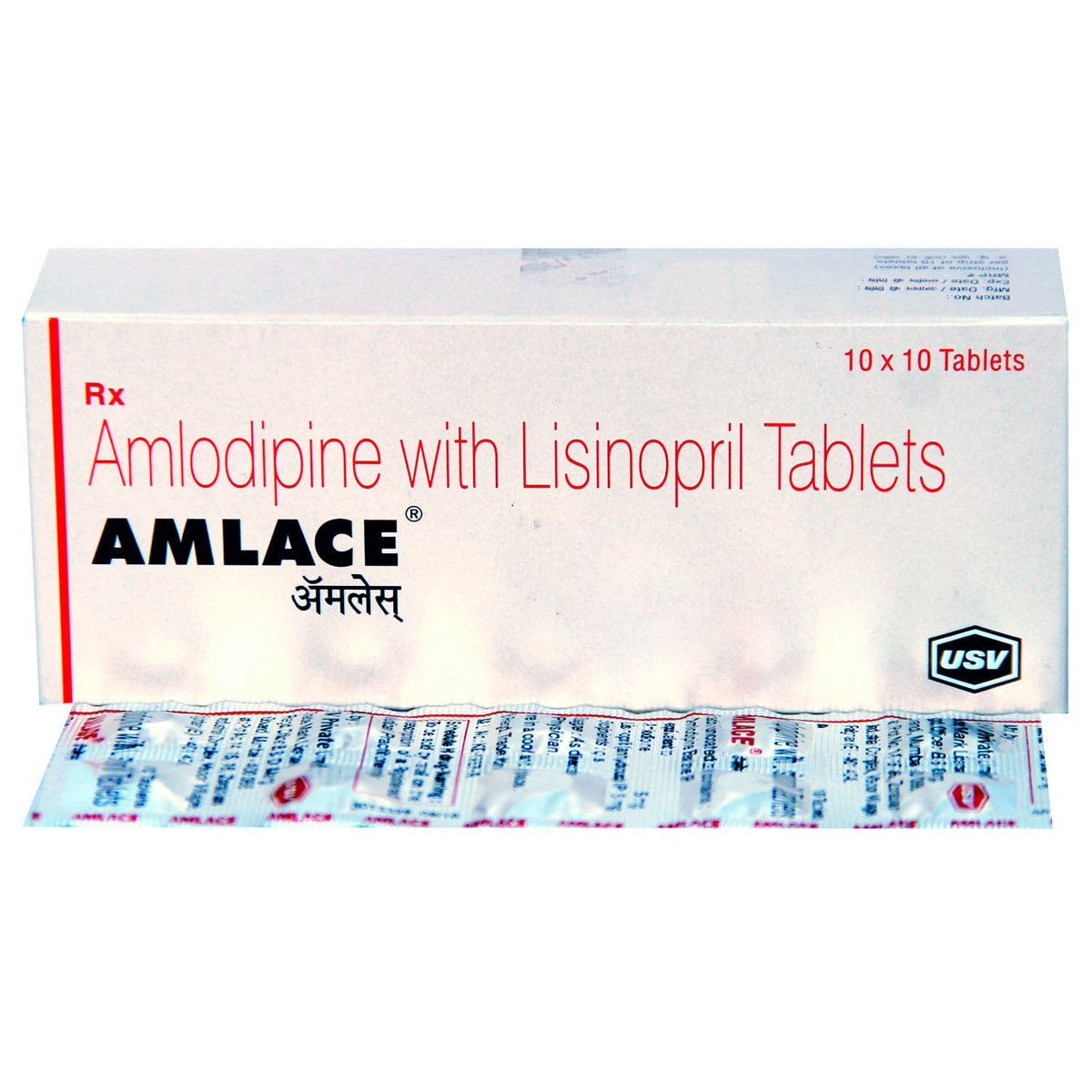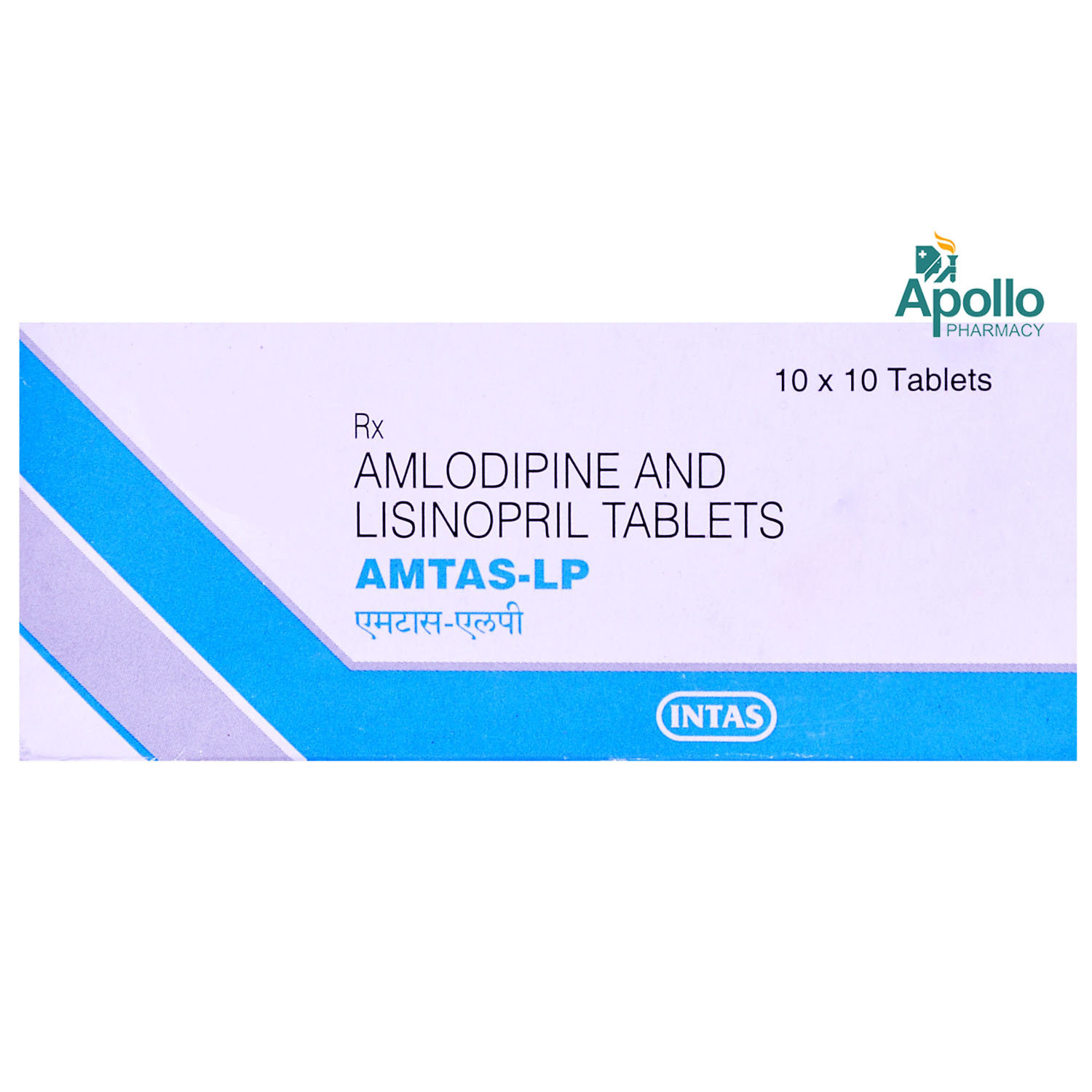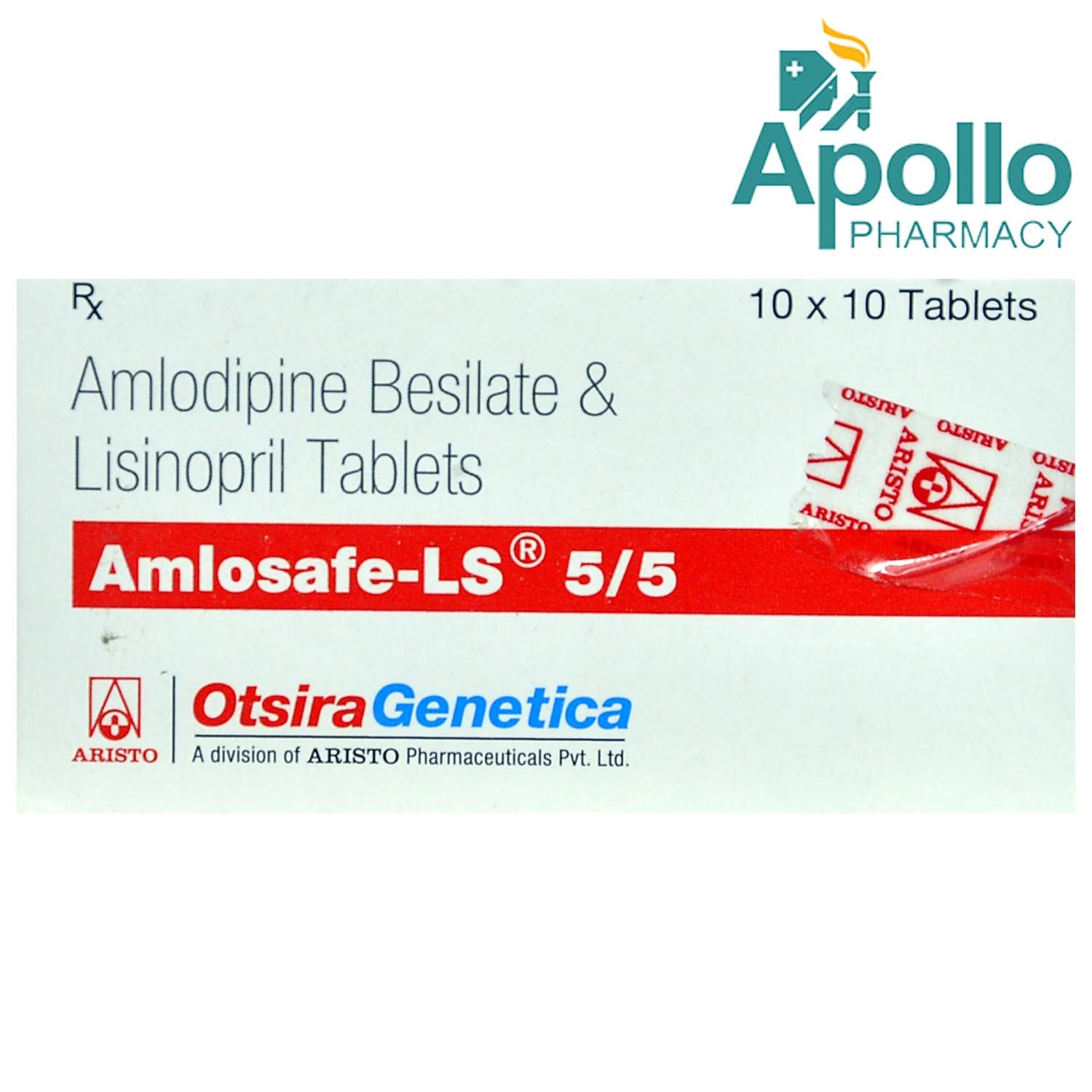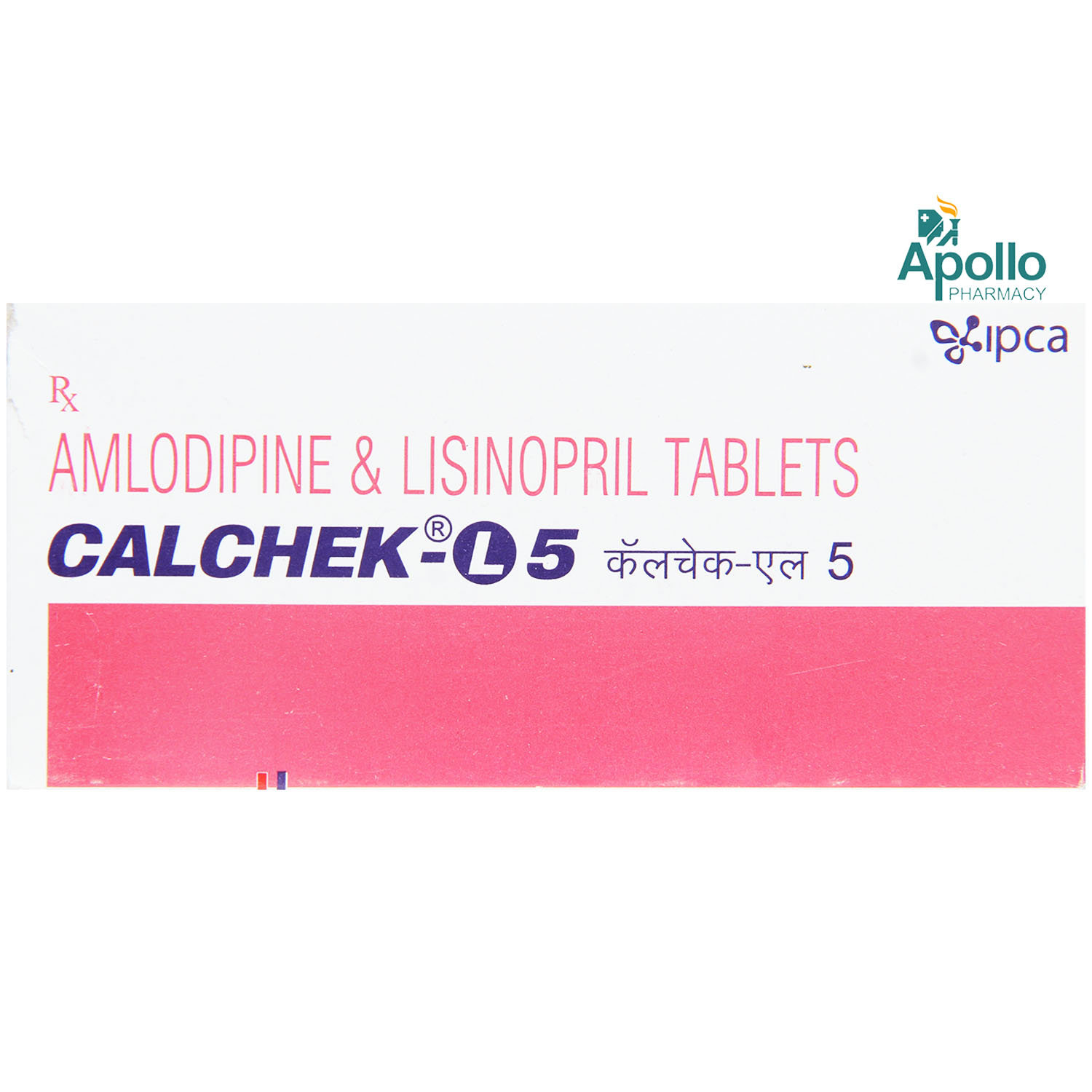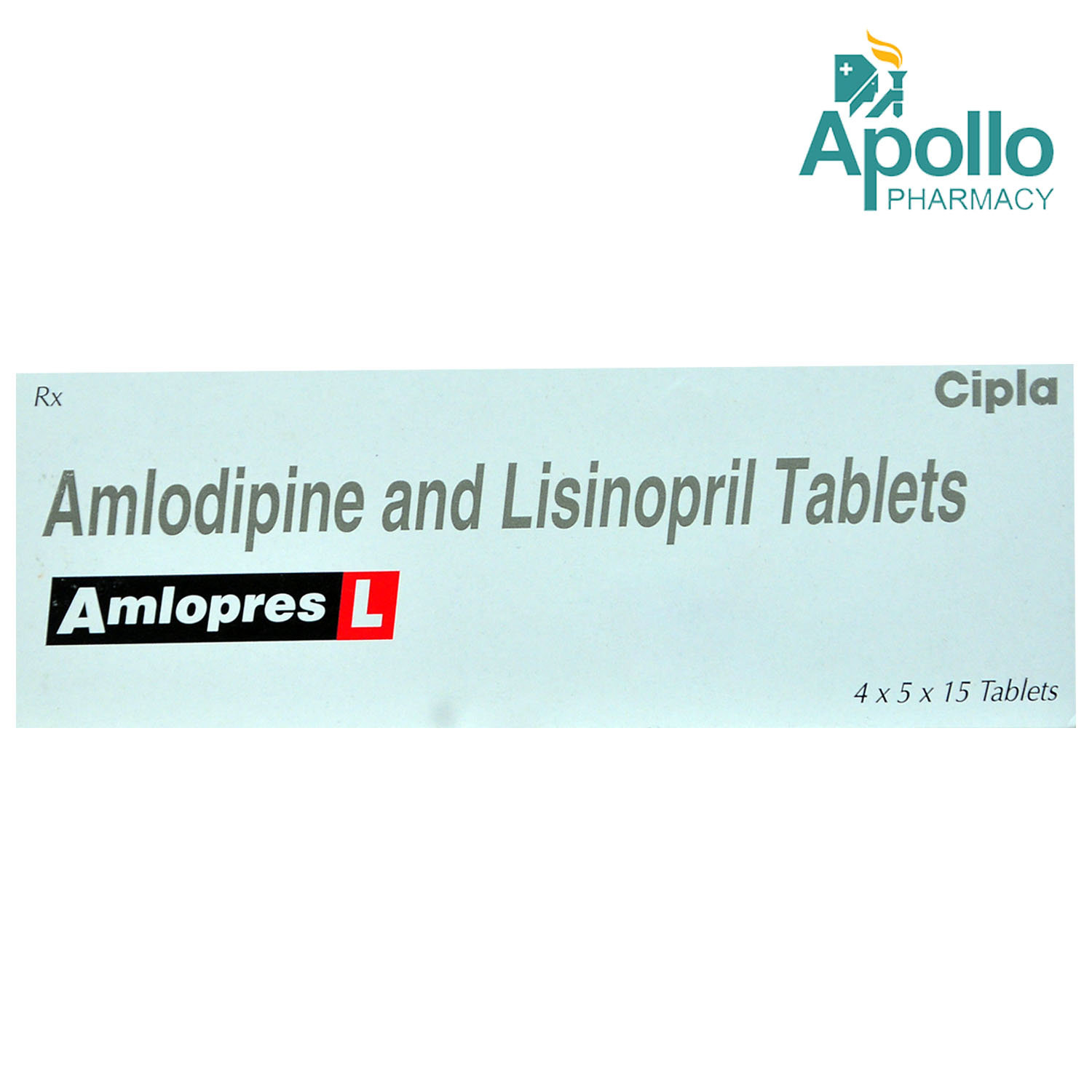ACEDIP 5MG TABLET
MRP ₹24
(Inclusive of all Taxes)
₹3.6 Cashback (15%)
Provide Delivery Location
Online payment accepted
 Prescription drug
Prescription drugWhats That
Composition :
Manufacturer/Marketer :
Consume Type :
Expires on or after :
Return Policy :
About ACEDIP 5MG TABLET
ACEDIP 5MG TABLET belongs to the class of 'anti-hypertensive drugs', primarily used to treat hypertension (high blood pressure). Hypertension is a medical condition in which the blood exerts high pressure (force exerted by circulating blood) against blood vessels' walls. This condition makes the heart work harder in pumping blood to the whole body. Hypertension can cause severe health complications, including stroke, heart failure, heart attack, and kidney failure.
ACEDIP 5MG TABLET is a combination of medicine that consists of Amlodipine (calcium channel blocker) and Lisinopril (angiotensin-converting enzyme inhibitor). Amlodipine belongs to the class of 'calcium channel blockers and is used to treat high blood pressure, Prinzmetal's or variant angina (chest pain), and other conditions caused by coronary artery disease. It relaxes blood vessels so that blood passes through them easily, lowering blood pressure. Amlodipine also improves blood supply to the heart muscle to receive more oxygen and thus preventing chest pain. Lisinopril belongs to the class of 'Angiotensin-Converting Enzyme (ACE) Inhibitors.' It relaxes and widens the blood vessels making it easier for the heart to pump blood throughout the body, lowering blood pressure. Lisinopril also decreases the body’s production of certain substances that raise blood pressure.
ACEDIP 5MG TABLET is an orally administered drug in the form of a tablet and capsule. You can take ACEDIP 5MG TABLET with food or without food. Swallow it as a whole with a glass of water. Do not chew, bite, or break it. Your doctor will advise you how often you take ACEDIP 5MG TABLET based on your medical condition. In some cases, you may experience blurred vision, sweating, confusion, tiredness, stomach upset, flushing (sense of warmth in the face, ears, neck and trunk), dizziness, headache, and swelling of the ankles or feet. Most of these side effects of ACEDIP 5MG TABLET do not require medical attention and gradually resolve over time. However, if the side effects are persistent, please contact your doctor.
Do not stop taking ACEDIP 5MG TABLET without consulting your doctor since it may worsen your condition and increase the risk of future heart problems. Regular monitoring of blood pressure, electrolyte levels and kidney functioning is advised while taking ACEDIP 5MG TABLET. Inform your doctor if you are suffering from kidney, liver or heart diseases. Please tell your doctor if you are taking other medicines or allergic to ACEDIP 5MG TABLET. Reducing the amount of table salt (sodium chloride) in your food often relieves the body's swelling. Let your doctor know if you use any prescription and non-prescription medications you are taking, including vitamins, before starting ACEDIP 5MG TABLET. If you are pregnant or breastfeeding, please tell your doctor so that the dosage of ACEDIP 5MG TABLET can be prescribed accordingly.
Uses of ACEDIP 5MG TABLET
Directions for Use
Key Benefits
ACEDIP 5MG TABLET treats hypertension (high blood pressure) and consists of Amlodipine (calcium channel blocker) and Lisinopril (angiotensin-converting enzyme inhibitor). Amlodipine is a 'calcium channel blocker' and treats high blood pressure, Prinzmetal's or variant angina (chest pain), and other conditions caused by coronary artery disease. It relaxes blood vessels so that blood passes through them easily, lowering blood pressure. It also treats chest pain by improving the blood supply to the heart muscle to receive more oxygen. Amlodipine also improves a person's tolerance to exercise and keeps the blood pressure at acceptable levels. Lisinopril is an 'Angiotensin-Converting Enzyme (ACE) Inhibitor.' It relaxes and widens the blood vessels making it easier for the heart to pump blood throughout the body, lowering blood pressure.
Storage
Drug Warnings
- Do not use ACEDIP 5MG TABLET if you are allergic to ACEDIP 5MG TABLET or its components.
- Please inform your doctor if you are using any prescription and non-prescription medications, including vitamins, before starting ACEDIP 5MG TABLET.
- Let your doctor know if you have any history of severe heart, kidney or liver diseases, high potassium levels (hyperkalaemia), bone marrow suppression, and aortic stenosis (heart valve problem).
- It is essential to inform your doctor if you are a breastfeeding mother before using ACEDIP 5MG TABLET since Amlodipine may pass into the breast milk.
- Lisinopril is not recommended during pregnancy since it harms the unborn baby. Please ask your doctor if you plan to conceive or are pregnant before using ACEDIP 5MG TABLET.
- ACEDIP 5MG TABLET can increase the chances of light-headedness so rise slowly if you are sitting/lying and avoid operating any machine or doing any work that needs mental alertness.
Drug-Drug Interactions
Drug-Drug Interactions
Login/Sign Up
Using Acedip 5mg Tablet together with dantrolene may increase the risk of hyperkalemia (high blood potassium).
How to manage the interaction:
Taking Acedip 5mg Tablet with Dantrolene can cause an interaction, consult a doctor before taking it. You should seek medical attention if you experience nausea, vomiting, weakness, confusion, tingling of the hands and feet, a weak pulse, or a slow or irregular heartbeat. Do not stop using any medications without talking to a doctor.
Combining Aliskiren with Acedip 5mg Tablet can increase the potassium levels in the blood.
How to manage the interaction:
Although taking Aliskiren and Acedip 5mg Tablet together can result in an interaction, it can be taken if a doctor has prescribed it. However, consult a doctor if you experience symptoms including weakness, tiredness, confusion, numbness or tingling, and irregular heartbeats. Do not discontinue any medications without a doctor's advice.
Using Acedip 5mg Tablet and mitotane together may drastically lower Acedip 5mg Tablet blood levels, which makes the medicine less effective.
How to manage the interaction:
Although co-administration of Acedip 5mg Tablet with mitotane can result in an interaction, it can be taken if a doctor has advised it. Do not discontinue any medications without consulting a doctor.
Using phenobarbital and Acedip 5mg Tablet may drastically lower Acedip 5mg Tablet blood levels, which makes the medicine less effective.
How to manage the interaction:
Although co-administration of phenobarbital with Acedip 5mg Tablet can result in an interaction, it can be taken if a doctor has advised it. Do not discontinue any medications without consulting a doctor.
Coadministration of Acedip 5mg Tablet and carbamazepine together may significantly reduce Acedip 5mg Tablet blood levels, making the medicine less effective.
How to manage the interaction:
Although there is an interaction between Acedip 5mg Tablet with carbamazepine, it can be taken if a doctor has advised it. However, if you experience any unusual symptoms contact the doctor immediately. Do not stop using any medications without talking to a doctor.
Using Acedip 5mg Tablet and phenytoin together may drastically lower Acedip 5mg Tablet blood levels, which makes the medicine less effective.
How to manage the interaction:
Although Acedip 5mg Tablet with phenytoin can result in an interaction, it can be taken if a doctor has advised it. Do not discontinue any medications without consulting a doctor.
Using Acedip 5mg Tablet and primidone together may lower Acedip 5mg Tablet blood levels, which makes the medicine less effective.
How to manage the interaction:
Although co-administration of Acedip 5mg Tablet with primidone can result in an interaction, it can be taken if a doctor has advised it. Do not discontinue any medications without consulting a doctor.
Coadministration of lemborexant and Acedip 5mg Tablet may increase the blood levels of lemborexant.
How to manage the interaction:
Although co-administration of Acedip 5mg Tablet with Lemborexant can result in an interaction, it can be taken if a doctor has advised it. However, consult your doctor if you experience abnormal sleep patterns, worsening of depression, changes in heartbeat, or headache. Do not discontinue any medications without consulting a doctor.
Taking simvastatin with Acedip 5mg Tablet may result in considerably higher blood levels of simvastatin and may increase the risk of side effects (liver damage and rhabdomyolysis - an uncommon but serious illness characterized by the breakdown of skeletal muscle tissue).
How to manage the interaction:
Although taking Acedip 5mg Tablet with simvastatin can result in an interaction, it can be taken if a doctor has advised it. If you have unexplained muscular pain, soreness, or weakness while using simvastatin, especially if these symptoms are accompanied by fever or dark-colored urine, consult the doctor immediately. However, if you develop a fever, chills, joint pain or swelling, unusual bleeding or bruising, skin rash, itching, loss of appetite, fatigue, nausea, vomiting, dark colored urine, and/or yellowing of the skin or eyes, consult the doctor. Do not stop using any medications without a doctor's advice.
Co-administration of Acedip 5mg Tablet can make Sirolimus may increase the risk of angioedema (a condition associated with swelling of the face, eyes, lips, tongue, throat, and occasionally also the hands and feet).
How to manage the interaction:
There may be a possibility of interaction between Acedip 5mg Tablet and Sirolimus, but it can be taken if prescribed by a doctor. However, consult the doctor if you notice any swelling of the face, eyes, lips, tongue, throat, hands and feet or have trouble breathing or swallowing. Do not stop using any medications without a doctor's advice.
Drug-Food Interactions
Drug-Food Interactions
Login/Sign Up
Lentils, Orange Juice, Oranges, Raisins, Potatoes, Salmon Dried, Spinach, Sweet Potatoes, Tomatoes, Coconut Water, Beans, Beetroot, Broccoli, Bananas, Apricots, Avocado, Yogurt
How to manage the interaction:
Taking Acedip 5mg Tablet with potassium-containing salt substitutes or potassium supplements can cause high levels of potassium in the blood. Avoid taking potassium-containing salt substitutes or potassium supplements while being treated with Acedip 5mg Tablet.
Diet & Lifestyle Advise
- Keep your weight under control with body mass index (BMI) between 19.5 and 24.9.
- Do regular physical activity or exercise for at least 150 minutes per week, or about 30 minutes most days of the week. Doing this can help lower your raised blood pressure by about 5 mm of Hg.
- Limit sodium chloride intake (table salt) in your daily diet to 2300 mg daily or less than 1500 mg is ideal for most adults.
- If you are taking alcohol, use only one serving for women and two servings for men.
- Quit smoking to lower the risk of heart disease.
- Avoid chronic stress, as it can raise your blood pressure. Try to enjoy and spent time with your loved ones to cope with stress.
- Monitor your blood pressure daily, and if you notice any fluctuations frequently, please contact your doctor immediately.
- Try including heart-healthy omega-3 fatty acid-containing foods in your daily diet. You can also use low-fat cooking oils like olive oil, soybean oil, canola oil, and coconut oil to lower your elevated blood pressure.
Side Effects of ACEDIP 5MG TABLET
- Confusion
- Sweating
- Tiredness
- Dizziness
- Headache
- Blurred vision
- Stomach upset
- Swelling of the ankles or feet
- Flushing (sense of warmth in the face, ears, neck and trunk)
Habit Forming
Therapeutic Class
All Substitutes & Brand Comparisons
RX
Out of StockAmom-L 5mg/5mg Tablet
₹45
(₹4.05 per unit)
87% COSTLIERRX
Out of StockAamin L 5mg/5mg Tablet
Medisys Biotech Pvt Ltd
₹49.81
(₹4.48 per unit)
107% COSTLIERRX
Out of StockAxipin L 5mg/5mg Tablet
Axis Life Science Pvt Ltd
₹57
(₹5.13 per unit)
137% COSTLIER
Drug-Diseases Interactions
Drug-Diseases Interactions
Login/Sign Up
FAQs
Drug-Drug Interactions Checker List
- SIMVASTATIN
- PREDNISOLONE
- BENDROFLUMETHIAZIDE
- NAPROXEN
- INSULIN GLARGINE
- PREGABALIN
- SITAGLIPTIN
- ALLOPURINOL
- SILDENAFIL
- METOPROLOL
- RAMIPRIL
- FUROSEMIDE
- IBUPROFEN
- METFORMIN
Special Advise
- Monitor your blood pressure regularly and seek medical advice if you notice any drastic fluctuations.
- ACEDIP 5MG TABLET may affect patients with hepatic impairment, and hence it is used cautiously, and Liver function monitoring and Liver Function Tests are advised to monitor the liver enzyme changes.
- Your doctor may advise you to get a regular kidney function test and blood examinations for potassium levels and other electrolytes while using ACEDIP 5MG TABLET to rule out any renal impairment.
Disease/Condition Glossary
Hypertension: When your blood pressure is too high, you have a chronic condition. The amount of blood pumped by the heart and the amount of resistance exerted by the arteries against the blood flow is called blood pressure. When the heart pumps more blood, the arteries narrow, and the blood pressure rises. Uncontrolled blood pressure can lead to serious heart problems such as stroke and heart attack. High blood pressure can also damage the brain (stroke) and lead to kidney failure. The systolic and diastolic pressures of blood are measured. The contraction and relaxation of the heart are represented by systolic blood pressure. Diastolic pressure is exerted in the blood vessels when the heart is at rest and not beating. The ideal blood pressure range is 90/60 mmHg to 120/80 mmHg. When systolic blood pressure exceeds 140mmHg, and diastolic pressure exceeds 90mmHg, hypertension is diagnosed. Hypertension symptoms include headaches, nosebleeds, vomiting, and chest pain.

Have a query?
Alcohol
Safe if prescribed
Alcohol may lower your blood pressure. Limit or avoid consuming alcohol while on treatment with ACEDIP 5MG TABLET is advisable.
Pregnancy
Consult your doctor
Lisinopril in ACEDIP 5MG TABLET is a pregnancy D category drug and is not recommended during pregnancy since it causes harmful effects on the developing foetus. However, it is advised to seek medical advice before using ACEDIP 5MG TABLET if you plan to conceive or pregnant.
Breast Feeding
Consult your doctor
There are limited studies on how ACEDIP 5MG TABLET affects breastfed infants. However, Amlodipine in ACEDIP 5MG TABLET passes into the breast milk during breastfeeding. Please consult your doctor before using ACEDIP 5MG TABLET if you are a lactating mother.
Driving
Safe if prescribed
ACEDIP 5MG TABLET may cause side effects from lowering blood pressure, such as dizziness or tiredness. If you feel dizzy or tired when taking this medicine, do not drive or use any tools or machines.
Liver
Consult your doctor
Let your doctor know if you have any history of liver diseases before using ACEDIP 5MG TABLET. Your doctor may adjust the dose based on your condition.
Kidney
Consult your doctor
Let your doctor know if you have any history of kidney diseases before using ACEDIP 5MG TABLET. ACEDIP 5MG TABLET is primarily eliminated by the kidney and can be accumulated in patients with renal impairment. Your doctor may adjust the dose based on your condition.
Children
Safe if prescribed
ACEDIP 5MG TABLET is not recommended for children as efficacy and safety have not been established.





